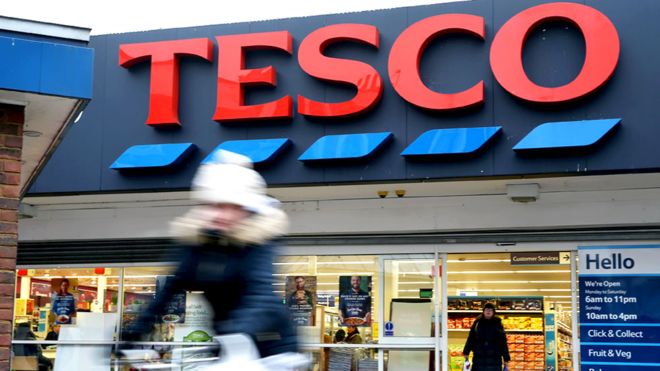
Tesco says it is planning a “strategic alliance” with French retail giant Carrefour, as the two try to use their joint buying power to cut costs and offer lower prices to customers.
The two plan a “strategic relationship” when dealing with global suppliers, and the tie-up will also mean sharing their own-brand products.
The move comes as retailers face an increasingly competitive environment.
Tesco is the UK’s largest retailer while Carrefour is Europe’s largest.
Last year, Tesco – which employs 440,000 people – reported profits of £1.3bn with sales of £57.5bn.
Carrefour operates 12,300 stores across more than 30 countries, employing about 375,000 people worldwide. Last year, it had sales of €88.2bn (£78bn).
The two have been talking for two years and, although no formal agreement has yet been signed, they said they were hoping to confirm a deal in the next two months.
Retail shake-up
Tesco chief executive Dave Lewis said: “By working together and making the most of our collective product expertise and sourcing capability, we will be able to serve our customers even better, further improving choice, quality and value.”
The grocery sector is currently going through a period of rapid change. Tesco itself recently completed the purchase of wholesaler Booker, and in April, Sainsbury’s said that it was in advanced talks to buy Asda from US retail giant Walmart.
The traditional big four UK supermarket chains – Tesco, Sainsbury’s, Asda and Morrisons – have faced increasing competition from the rapidly-expanding budget chains Lidl and Aldi over the past few years, and there is now the added threat of internet giant Amazon moving into the sector.
Last year, Amazon bought upmarket grocer Whole Foods. In the UK, Amazon offers food sales through its Amazon Fresh service, although currently that is still focused on Greater London and parts of the South East.
“Another price war is now looming in the UK supermarket sector,” said Laith Khalaf, senior analyst at Hargreaves Lansdown. “The latest Tesco partnership looks like a direct response to the threat posed by the proposed merger of Sainsbury’s and Asda, who will have access to the global buying power of Walmart as a result.
“The sector is already fiercely competitive, in no small part thanks to the emergence of the discounters Aldi and Lidl, and that comes against a background of shifting shopping habits.”
Patrick O’Brien, UK retail research director at GlobalData, noted that a key focus of the tie-up “is to reduce prices on own-brand products, and this is more of a direct response to Aldi and Lidl, whose offers are heavily weighted towards own-brand”.
He added that from the point of view of suppliers, “this is another signal of battles ahead”.
“Sainsbury’s and Asda have made it clear that they will target their largest suppliers for cost reductions by flexing their increased scale, and Tesco and Carrefour will look to do the same while reducing the number of branded products they sell as they increase their own-brand ranges.”
‘Great opportunity’
Tesco’s performance has steadily improved since 2014, when it posted the worst results in its history with a record pre-tax loss of £6.4bn. It recently recorded its 10th consecutive quarter of rising sales and said its growth plans were on track.
In January, Carrefour announced a major transformation plan that involved making cost cuts of €2bn by 2020, and investing €2.8bn in e-commerce by 2022.
Announcing the planned tie-up with Tesco, Carrefour Group chief executive Alexandre Bompard said the agreement was, “a great opportunity to develop our two brands at the service of our customers”.
“This international alliance further strengthens Carrefour allowing it to reach a key milestone in the implementation of its strategy.”

